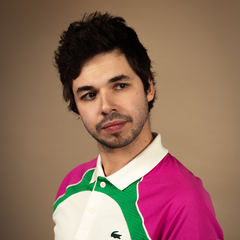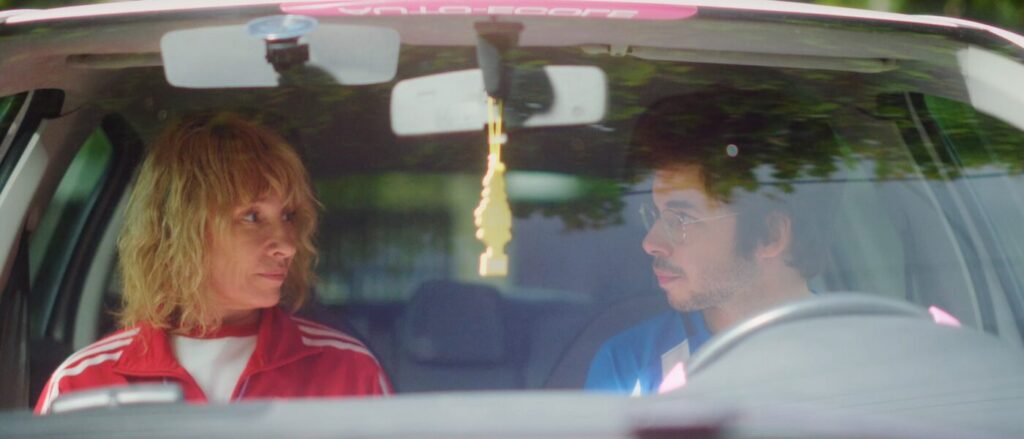French director Martin Jauvat talks his film ‘Baise-en-ville’ at Cannes

A refreshing gem in this year’s Festival de Cannes lineup in the Semaine de la Critique sidebar was “Baise-en-ville,” a defiantly independent comedy from a young French filmmaker, Martin Jauvat. The term “baise-en-ville” is a tongue-in-cheek French expression that refers to a small overnight bag — typically used when someone plans to stay the night somewhere, often for a romantic or sexual encounter. The term is a pun: “baise” means “to have sex,” and “en ville” means “in the city,” so it roughly implies “sex in the city” or “hook-up in town.” This uniquely French term is also a metonymy, referring to a no-strings-attached rendezvous — equal parts practical and provocative.
Through absurdist humor and surprising tenderness, this witty and offbeat film, with a touch of the cartoonish and burlesque, plays with the codes of sex and gender while exploring modern love and the awkwardness of human connection and cleverly dismantling clichés of love in the city.
The main character Sprite is played by the filmmaker himself, and is an out-of-place young man navigating a world of bold, sexually confident women and unexpected intimacy while fending against economic precarity by taking up a job as “the intern’s intern” in an obscure party-cleaning start-up. Jauvat succeeds in capturing a generation caught between romantic ideals and harsh economic realities, hinted at in its sly critique of the start-up generation.
The film pointing out the absurdity of the start-up nation gives rise to many laugh-out-loud moments. But the film digs even deeper and delivers an insightful generational perspective on masculinity and how relationships between men and women have evolved.
The film has a genuine power and authenticity that perhaps stems from autobiographical sources. With its lo-fi, handmade charm, “Baise-en-ville” is a testament to the creative power of personal cinema. It’s exactly the kind of bold, singular voice that speaks to the ethos of The Independent — a film made outside the system but with its finger firmly on the pulse of now.

At Cannes, I had the opportunity to sit down with Jauvat and talk to the filmmaker about language, libido and the art of telling the truth through laughter.
Dana Knight: Thank you for enriching my French vocabulary — I wasn’t familiar with the term baise-en-ville until now. How did you come across this very specific concept and the fashion item that comes with it?
Martin Juvat: You’re welcome! To be honest, I wasn’t familiar with this concept either until very recently. It’s extremely old-fashioned and quite forgotten! I might be one of the few people from my generation to know what a “baise-en-ville” is. That’s what makes it so precious! My encounter with this object is completely random: a colleague at work saw my toothbrush in my backpack and told me: “Wow, nice baise-en-ville!” I was amazed by this concept, and immediately decided to make a movie based on it.
DK: The notion of a baise-en-ville adds a premeditated, almost transactional layer to what’s often idealized as romantic love — especially in French cinema. Is there a subtle critique here of how modern relationships navigate between passion and pragmatism?
MJ: Completely. I’m terrified by dating apps. I feel like it destroys love, making everything a competition. You have to be the best, to look attractive, to make people click on your profile . . . I feel like the whole world has become a competition. For love, for work, for everything. And I’m tired of having to perform all the time! I have kind of an old-fashioned vision of love. I believe in true love. But I find it very interesting and funny the absurd and awkward idea of dating a stranger. I feel like it’s precious comedy material. But at the same time, yeah, I want to criticize the absurdity of uberization, which I think makes our world less human.
DK: Some of the female characters in the film are sexually forward while Sprite is far more reserved — a fish out of water, and a brilliant source of comedy. How did you work with the cast to create those moments of physical and tonal humor? Was it heavily scripted or did you allow for improvisation?
MJ: I love writing dialogues. That’s my favorite part when writing a script. I’m very proud of my dialogues, I love them, so I’m not a big fan of improvisation! Every now and then, when somebody has a good idea, of course I’m delighted and want to put it in the scene. But then it becomes part of the scene, and we rehearse, so it can’t be considered as improvisation anymore. I’m very close to the actors, with Anaïde and Mahaut in particular (one is my best friend, the other is my girlfriend), we’ve shot many movies together so it’s easy to find a connection. We are used to it. I wanted to try something physical with my body, to add a physical dimension to the dialogues and it was very fun to do. I try to work with people I know well so it helps to have fun and to be funny.
DK: Sprite’s most meaningful connection is with Marie-Charlotte, his driving instructor, with a surprising Emmanuelle Bercot in the role. There’s affection, but also tension, even a touch of cruelty at times, as if the film is peeling back the niceties to expose more complex emotional truths. Do you think total honesty is necessary in a relationship — or even desirable?
MJ: I find it very difficult to be honest in real life, to tell people how you feel. Being a boy, you grow up learning how to be always tough, so it’s very embarrassing to be honest about things like sadness, loneliness or anxiety. It’s the same thing about sex: it’s difficult to admit that you worry about sex when you are a boy. Being sexually strong and active is a crucial part of manhood. I think it’s very toxic, and I’m trying to debunk these clichés in my movies but also in my personal life. It’s hard work. So I think honesty is very important but I try to tell it with humor.
DK: The film also captures something very current: the precariousness of work, especially for younger people. There’s a sharp irony in how it depicts the “start-up nation,” particularly with Sprite being offered the role of “the intern’s intern.” Were you aiming to reflect generational frustration, or was that more of a comedic device that naturally arose from the setting?
MJ: My generation lives in a precarious world. Everyday we experience the precariousness of work, money, love, friendship, family, but also, of the whole world around us: poverty, wars, inequalities, ecological disasters happen everyday. We have to find a way to live with that, and it is often absurd. The intern’s intern reflects, on a very small and anecdotical scale, the absurdity and precariousness of the world we have to live in. Also, I experienced a similar situation at work. My producer always works with interns, and I saw one day an intern conducting a job interview to hire another intern. Then, the new intern was trained by the intern. He had become an intern’s intern. I love how the absurdity of our world can be violent and funny at the same time.
DK: Talking about settings, tell me about your love for suburban settings at night and their poetry.
MJ: I spent so much time on night buses. When you live in the suburbs there is nothing to do, so we used to go out in Paris with my friends. But the last train back to my hometown is very early, so I used to miss it every time and I was forced to spend hours and hours on night buses. I was so bored. I felt so vulnerable, alone in those buses crossing empty, dark suburbs. They felt like ghost towns. I think suburban settings have a very strange, unique mood. They are dark, scary; they almost look unreal, like landscapes from the moon. I love this particular atmosphere, I really think they are full of poetry. Also, the places you see in the movie are all from my hometown and around, I lived all my life through these landscapes, and it was important for me to show them on the big screen. Like a kind of homage.
DK: The press notes mention that your work is largely autobiographical. Do you approach filmmaking as a way of consciously processing your own experiences, or do you allow stories to surface more intuitively, with personal elements only becoming clear in retrospect?
MJ: It is true that I consider this story, and the others I wrote before more or less autobiographical. I wouldn’t feel myself if I tried to tell another person’s story. But, at the same time, they are really different from my personal life. “Baise-en-ville” is inspired by a time of my life, when I was around 25, where I lost my girlfriend, my job and quit my studies at the same time. I tried to find a job and to get my driver’s licence, as does the character in the movie, but I never met a driving instructor as crazy as Marie-Charlotte. I never had such terrible dates. I consider my personal life the starting point, wondering what could have been going differently. Then I have fun and imagine things, jokes, scenes . . . like a child, in a way. But doing this also helps me to process my personal experiences, which are most of the time disappointing. It’s like an exorcism.
DK: The film carries the intimate, handmade feel of an indie production. I know you’ve self-produced past work — was that the case again here? What kind of budget did you work with, and did financial constraints shape the creative choices in any meaningful way?
MJ: Well it’s kind of scary for me if you feel like this looks like a self-produced movie — because it was not! Not at all! It’s by far the most expensive movie I ever made, costing more than €3 million. Which was kind of stressful for me, as all the other movies I made cost almost nothing. But I love indie spirit, so I take this question as a compliment! I loved finding solutions with reality when you don’t have the budget to do as you would have dreamt of. I think directing must always remain a dialogue with reality, whether you have money or not. Anyway, I felt a complete freedom, because my producer knows me very well, he produced all my movies and trusts me even when I have crazy ideas. He is the perfect producer!
DK: Finally, is there anything you’d like to share with an American audience — something you hope they take away from the film, or a detail they might not otherwise notice?
MJ: I know my film is very French, but I’m inspired by American representations of the suburbs. That’s my style. I love American movies, and I feel like an American, even though I’ve never been to the U.S. Because French representations of the suburbs always talk about drugs, buildings, violence. But my home town looks like an American one, like the cities of “The Truman Show,” “Donnie Darko” or “It Follows.” So I hope they will appreciate this French homage to the American suburbs!
